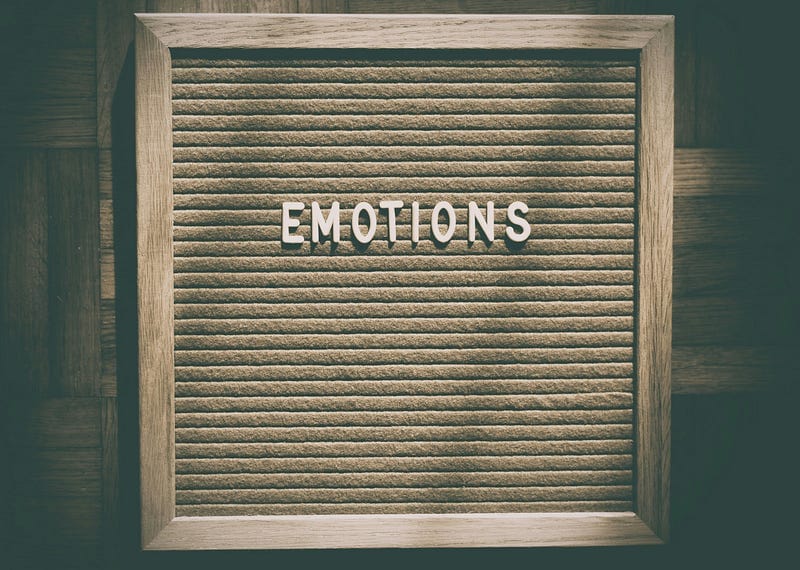Unboxing My Emotions
From emo and numb → emotional

This blog is somewhat of a prequel to my other personal growth blog: LINK HERE.
I remember hitting puberty. Do you?
Those awkward moments in middle school and into high school when you’re learning to navigate increasingly complex social situations and novel dynamics as hormones start to fluctuate. I remember going to my mom for support in some of the more complicated situations. There was one specific moment I recall sitting in the car casually mentioning something and instead of getting validation, I got a reaction that was far more intense than what I wanted. In essence, from that moment onward, I felt like I couldn’t share the things in my life with her.
I also remember a phase of my adolescence during which I felt like I couldn’t be myself at home. I hid my joy. I hid my pain. I hid almost every single emotion I felt because I didn’t feel like they’d be validated without some reaction I didn’t want. I also didn’t have the tools as a child to navigate that relationship with my family — isn’t it their job to make me feel emotionally safe at home?
I had always felt emotionally safer with my friends. It was easier to be my angsty self with them. They’d still be my friends regardless of what nonsense we were engaging in.
For the last 2 years of high school, I had my first taste of independence. The high school I attended during those years was residential. I spent the weekdays away from home living in a dorm. I finally felt like I could be myself — express my true thoughts and opinions. Every single time I shared something, I would receive validation. Very direct validation. A validation that even I, as the receiver, had never experienced or accepted for myself yet. It was jarring, but very needed.
“You are valid.” “Your experiences are valid.”
The people saying this to me did not share the same experiences; however, they let me know that my unique perspective and history was just as important. It was my lived truth, and they acknowledged that. I felt heard for the first time.
When I moved on to undergrad in university, I was still very much my emo and slightly numb self. I never really knew how to appropriately answer, “How was your day?” anytime my friends asked. “Good enough,” was how I’d always respond. One of my friends never failed to let me know that “that [was] not a real answer.” (Thank you, you know who you are.)
At some point halfway through university, I came across the HealthyGamer YouTube channel and Twitch stream. I started watching these psych videos to learn more about myself and navigate my feelings. I don’t recall how or why these videos caught my attention, but I can give credit to the time I spent consuming that content for teaching me how to open the floodgates to my emotions.
I resonated with a lot of the content that was shared. I learned how to acknowledge and process past hurt. I learned how to recognize, value, and trust my friends. I learned how to take risks. I even learned how to validate the experiences of others. I learned about reflexive listening — the process of repeating and rephrasing what I hear to make sure that I am understanding it correctly while giving the other person a chance to clarify and dive deeper.
That’s just the learning. Much like how in-person therapy works, a lot of the first steps in tackling issues is learning to become aware, and then, actually gaining that awareness. I gained a lot of self-awareness in undergrad, maybe to a fault.
I remember for a solid semester in my junior year, I started feeling a lot. I also cried frequently. I would joke to myself and others that the amount I cried made up for my lack of crying while growing up. I was crying about the stress at school and crying to process past hurts. Even my MBTI changed from INTJ/ENTJ, what it was in middle school, to ISFP. I began to judge less. I began to feel more.
With the opening of my emotional floodgates, I also had to learn how to cope with the emotions and manage them more healthily — to not avoid them and to not push them down into a box to be locked back up. I didn’t want to lock my emotions back up. I was finally free to feel things and life began to seem more vivid. I put in a lot of effort to open those floodgates; I didn’t want to return to how I was before.
Learning to manage my emotions has been a long process. I’ve learned how to communicate my needs and express how I’m feeling. I’ve learned how to manage my impulsive emotional reactions and my anxiety trigger responses. Not just learn, but also slowly put the techniques into practice.
I’ve hurt others and made mistakes in my emotional growth journey. I’ve run into novel situations and continuously improve how I face them. I couldn’t have made all of this growth without the patience and support of my friends, and the unconditional love of my imperfect parents.